The following is a translation of reports from the Center for Human Rights Legal Action (CALDH), one of the plaintiff organizations in the genocide case against former dictator Efraín Ríos Montt and his former head of military intelligence, José Mauricio Rodriguez Sánchez. While witnesses and plaintiff organizations continue to uphold the validity of the 2013 sentence that convicted Ríos Montt of genocide and crimes against humanity, they participate in ongoing retrial proceedings in an attempt to exhaust all legal possibilities for justice in Guatemala. As the genocide retrial continues behind closed doors, closed to the press and international observation, CALDH is publishing daily summaries of trial proceedings. Photo: La Masa. For original materials in Spanish from CALDH, visit their website.
“…They threw me from a bridge when I was a child…” – Horror stories from the massacre of Chel, Chajul
Day 14. Over the course of the day in Nebaj, Quiché, the genocide trial continued as the Tribunal listened to four women and one man recount the terror they lived through during the armed conflict when the army arrived in their communities.
In the testimonies given today, witnesses recounted how soldiers arrived to the community of Chel, Chajul in 1982 and massacred the community, burning their homes and crops, raping the young women, and killing the people – including children. Many children were thrown from the bridge into the river; many died from the fall but some survived, including an 8-year-old girl at the time who testified today to having survived the massacre that killed her mother, father, and other family members. Her tears could not be contained as she explained that as a young girl, she was thrown from the bridge and left alone in life without any family, having to survive by herself. After the massacre, survivors counted 96 people who were killed.
Another woman explained to the Tribunal that when the soldiers arrived in her community, they massacred some of the people, while others managed to escape to the mountains where they hid under rocks and had to deal with hunger and the cold. She was pregnant at the time and testified to giving birth in the mountains with the help of a midwife.
Other testimonies told about how various survivors of the massacres fled to the mountain where they lived in inhumane conditions, given that they could not return to their communities because the army had burned and destroyed them. In the mountains, they faced persecution and bombing by the army. They lost family members who died of starvation, sicknesses, and other conditions faced under displacement. The witnesses recounted the suffering they faced as they fled to the mountains.
Outside of the judiciary where the trial is being carried out, survivors gathered to express their support for the witnesses and demand justice for genocide.
The Sentencing Tribunal will continue hearing from witnesses who are ill or elderly tomorrow in the judiciary of the municipality of Santa María Nebaj, Quiché.
Guatemala April 20, 2016
Association for Justice and Reconciliation – AJR
Center for Human Rights Legal Action – CALDH
“They broke the stones to grind corn…” – Tribunal hears testimonies in Nebaj, Quiché
Day 13. The municipality of Santa María Nebaj awoke to arrival of the High-Risk Crimes Court “B,” present in the municipality to hear testimonies from witnesses who are older than 70 or too sick to travel to the capital to testify against José Efraín Ríos Montt and José Mauricio Rodríguez Sánchez, who are currently on trial for genocide and crimes against humanity.
Women and men from different human rights, women’s, and youth collectives and organizations gathered in front of the judicial offices to carry out cultural activities in support of the witnesses who testified to what transpired in the Ixil region during the de facto government of Ríos Montt. However, former civil defense patrollers (PAC) and retired military were also present, carrying signs with messages of support for Ríos Montt and against the judicial process.
The Sentencing Tribunal heard from five elderly witnesses – two women and three men – who testified to how the army came to their communities and carried out scorched earth policies, including burning their homes, crops, corn, beans, animals, and tools, breaking the stones upon which they grind their corn. One witness testified to how his 17-year-old son was shot alongside seven others.
They explained how they fled to the mountains once the army arrived. One witness said that three months after he fled to the mountains, soldiers found them, killed his 5-year-old son and disappeared his three daughters. He said that when the soldiers found women, they raped them. He also said that the children had their throats slit or were taken by the feet and killed with a stone or a stick.
One witness testified that the army captured entire families and held them at the military base. The army attacked the communities, killing many people. Another witness recounted the inhumane conditions they had to live under after escaping to the mountains, relying on herbs and going without water or salt as they hid themselves beneath rocks so as to not be seen by helicopters. He testified to burying family members who died along the way.
Tomorrow, April 20, the Sentencing Tribunal will continue to hear from witnesses who are too ill or who are too old to travel in the judicial office of the municipality of Santa María Nebaj, Quiché.
Guatemala, April 19, 2016
Association for Justice and Reconciliation – AJR
Center for Human Rights Legal Action – CALDH

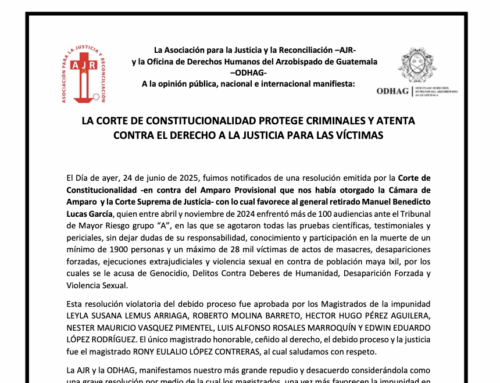
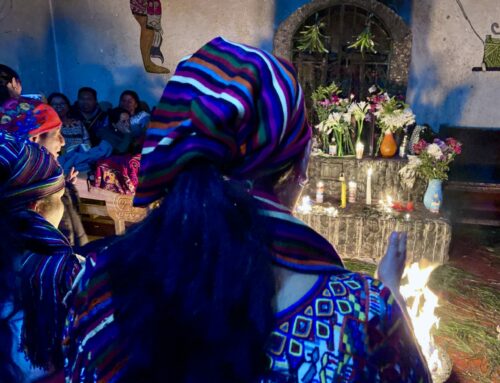
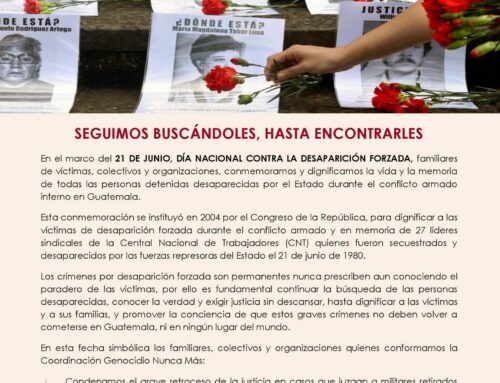
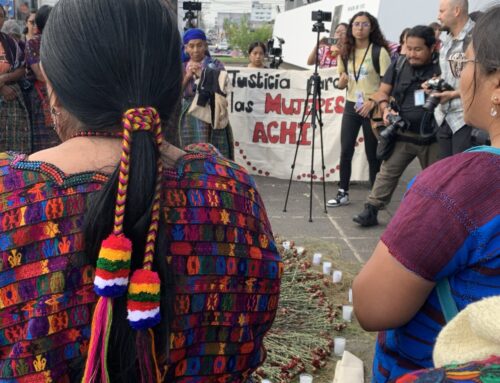
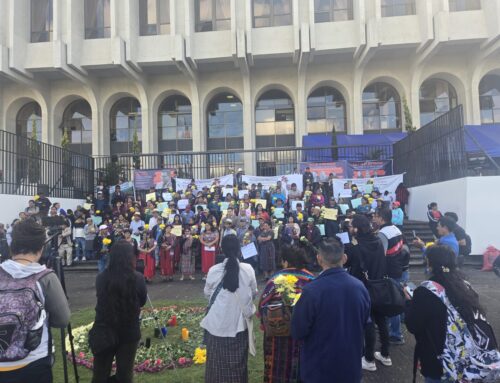
Leave A Comment